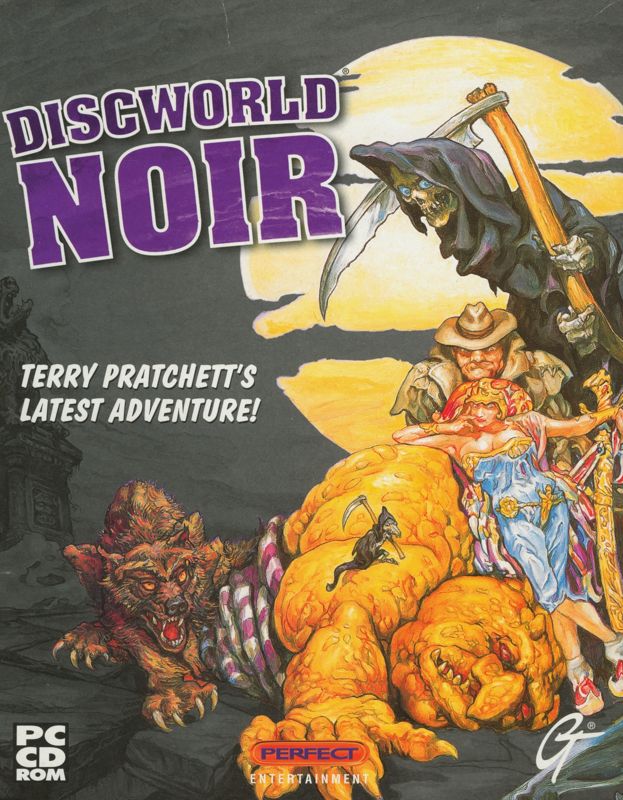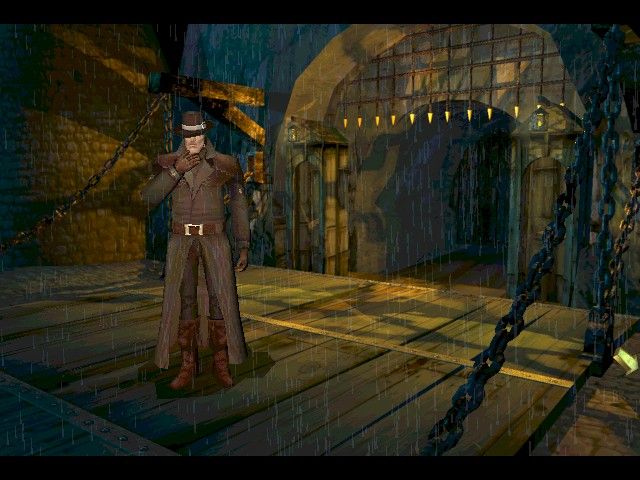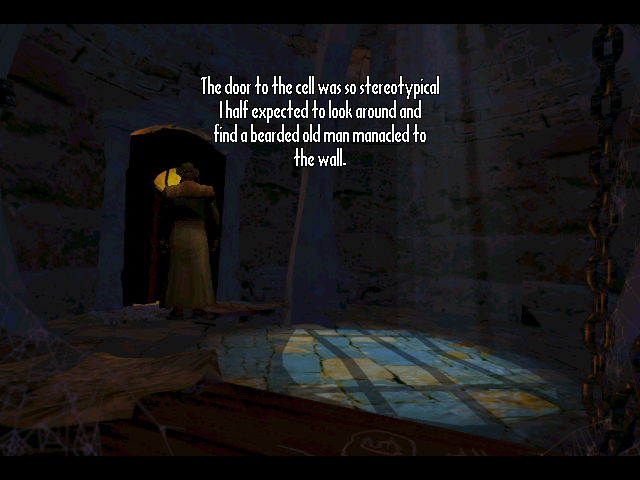Retro Replay Review
Gameplay
Discworld Noir breaks away from the standard inventory-driven puzzles of its predecessors and drops players into the trench coat of Lewton, a sarcastic private detective navigating the rain-slick streets of Ankh-Morpork. Instead of stockpiling every random object you can hoard until some obscure combination opens a door, you collect clues in Lewton’s notebook and apply them to the right conversations and scenarios. This approach transforms each dialogue into a cerebral exercise, where spotting the correct piece of evidence or recalling a hidden detail seals your progress.
(HEY YOU!! We hope you enjoy! We try not to run ads. So basically, this is a very expensive hobby running this site. Please consider joining us for updates, forums, and more. Network w/ us to make some cash or friends while retro gaming, and you can win some free retro games for posting. Okay, carry on 👍)
The heart of the gameplay lies in conversation. Every NPC interaction demands attention: tone of voice, choice of clue, and timing can close or crack open a story thread. As you probe the city’s lowlifes and aristocrats alike, the “Clue Link” system illuminates connections when you’ve gathered enough information. It feels like real detective work—assembling fragments of gossip, statements, and obscure details into a coherent lead that propels you toward the next scene.
Occasionally, the game challenges you with logic leaps that feel more obtuse than fair, especially when the right “aha!” moment requires linking two seemingly unrelated clues. Yet these hurdles underscore the gritty noir spirit: a private eye seldom has everything handed to him. Overall, Discworld Noir’s gameplay shines when it simulates true investigative momentum, where every choice can mean the difference between unraveling the conspiracy or hitting a dead end in the shadows.
Graphics
Launched in the late ’90s, Discworld Noir still impresses with its moody, pre-rendered backdrops and early 3D character models. Streets glisten under perpetual drizzle, neon signs drip reflection, and each alley is bathed in chiaroscuro lighting that oozes noir style. The contrast between sharp highlights and deep shadows makes every location—from smoky taverns to fog-bound wharfs—feel alive with mystery.
Character models occasionally exhibit the blocky silhouettes typical of the era, but their animations and facial expressions—especially in close-up interviews—capture Lewton’s bemused smirk or a suspect’s twitching guilt. Textures often surprise with intricate details, like the rivets in a troll’s armor or the grain of a bar stool. This blend of 3D actors against painted environments preserves a timeless charm that cinematizes your detective journey.
While modern gamers may notice some jagged edges or simpler lighting effects compared to today’s titles, the artistic direction sustains immersion. Rain droplets cascade realistically, neon reflections shimmer, and the soundtrack’s jazz-infused score perfectly complements the visual mood. In short, the graphics don’t aim for photorealism—they aim for atmosphere, and they succeed brilliantly.
Story
At its core, Discworld Noir is a tale of love, betrayal, and hidden conspiracies in a city that never sees the sun. Lewton, a down-on-his-luck private investigator with a razor-sharp tongue, is hired by the enigmatic Carlotta to find her missing lover. What begins as a straightforward missing-person case quickly entangles Lewton in secret societies, fanatical cults, and power plays among dwarves, trolls, and corrupt officials.
The narrative unfolds like a classic film noir screenplay—each chapter dripping with cynicism, dark humor, and slippery plot turns. Expect double-crosses, physical peril under an Umbrella Bar’s flickering neon, and whispered revelations in cryptic back alleys. The story culminates in an epic confrontation with a sinister force that threatens not just a wayward lover, but the soul of Ankh-Morpork itself.
What elevates the game is its faithful integration of Terry Pratchett’s world, yet with a mature tone more akin to a shadowy crime thriller than a whimsical comedy. Carlotta’s motives, Lewton’s own tortured history, and the moral grey zones of investigating the city’s underbelly create a layered narrative. Players find themselves genuinely torn between empathy and suspicion—hallmarks of an engaging mystery.
Overall Experience
Discworld Noir stands as a bold departure from lighthearted fantasy adventures. Its strengths lie in its immersive detective mechanics, richly atmospheric visuals, and a storyline that embraces the darker corners of Pratchett’s universe. Every soaked pavement and whispered clue strengthens the illusion that you’re truly stalking justice in a city rife with secrets.
Admittedly, some puzzles can be finicky, and the dated 3D models may jar modern eyes. However, these are small trade-offs for an experience that feels unique even two decades after its release. The game’s narrative pacing, jazz-lounge soundtrack, and cinematic presentation coalesce to deliver a memorable foray into interactive noir fiction.
For adventure enthusiasts seeking more than fetch-quests—those craving a detective thriller wrapped in Discworld’s distinctive absurdity—Discworld Noir remains a must-play. Its blend of cerebral gameplay, atmospheric design, and morally complex storytelling makes it a standout in both the adventure and noir genres. Step into Lewton’s world, but beware: in Ankh-Morpork, truth chills you to the bone.
 Retro Replay Retro Replay gaming reviews, news, emulation, geek stuff and more!
Retro Replay Retro Replay gaming reviews, news, emulation, geek stuff and more!









Reviews
There are no reviews yet.